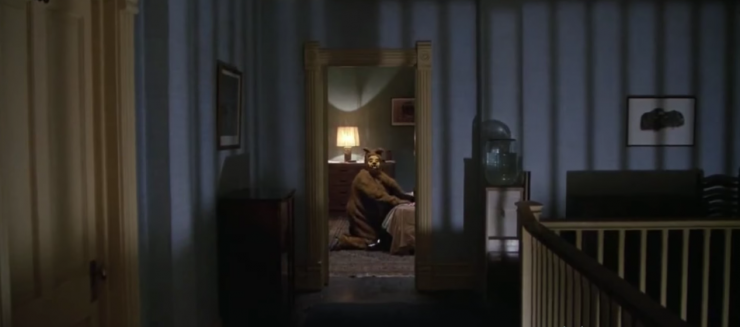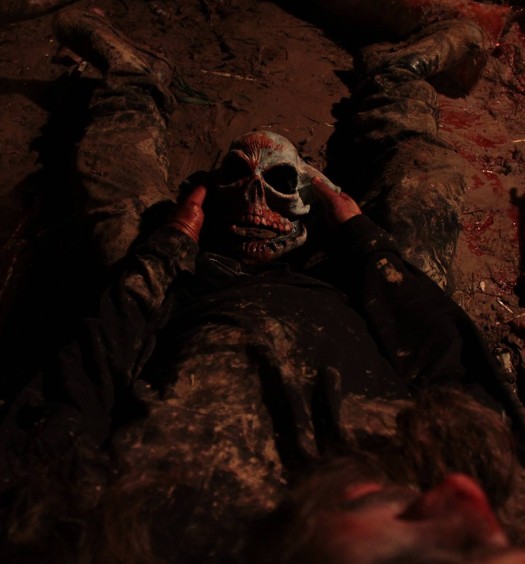The first time I had ever heard of The Shining, it was because my older brother, who was 12 years old at the time, came to me in a breathless panic. He had fallen asleep on the couch while watching Die Hard, and as luck would have it, The Shining was the next movie to play. He heard a woman’s laughter coming from the TV, and his eyes shot open. On the screen, a naked, bloated hag of a woman was shuffling towards him, mocking him with laughter as she stared into the camera. It was the dead bathtub lady from The Shining. He ran into my room in terror, tears streaming down his face. Such horror. Poor kid, he never got over that.
I can never remember how we found out the movie was called The Shining—only that I made a big deal of making sure I watched the movie that scared my older brother to tears. As the younger brother, I was duty-bound by law to have this information, perhaps trading it for a favor one day.
Anyway, since that day forward I’ve loved The Shining. Who doesn’t? It’s a timeless classic. Jack Nicholson’s performance as Jack Torrance is transcendent, and Shelley Duvall’s terror is perhaps the most frightened a person has ever been in a movie. Probably only Marilyn Burns of Texas Chainsaw Massacre comes close to exacting the terrific panic of imminent mortality like Duvall does in The Shining.
“Shelley Duvall’s terror is perhaps the most frightened a person has ever been in a movie.”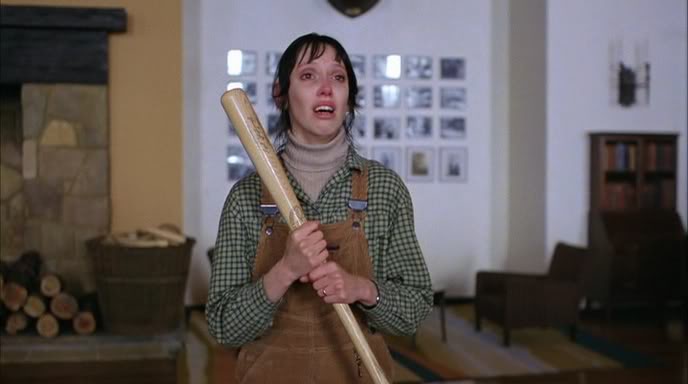
I had always known the movie was based on a book by Stephen King. My mother was a constant reader. I remember that much. I also knew that the film was different from the book. Oddly enough, and this may say a lot about the dimwit I was back then, it never occurred to me to read the book. Not once. But more on that later.
I say all this because there’s this scene at the end of The Shining. That bizarre scene where Wendy is running through the Overlook and is beset by all these hotel horrors. At one point, she sees a man in a dog costume giving fellatio to a tuxedoed gentleman in one of the rooms. They both look up at her casually like she had just interrupted them to ask for their order.
Being that this was a Stanley Kubrick movie, I assumed that it was some weird Kubrickian shit. I leave the speculation to the loons on the satirical yet illuminating documentary Room 237. So I didn’t know what to make of the scene—I never have. I’ve watched this film well over fifty times in my life. Do you think I could be a tad more curious? I’ve never even considered looking it up once the internet became a thing.
But then I read the book.
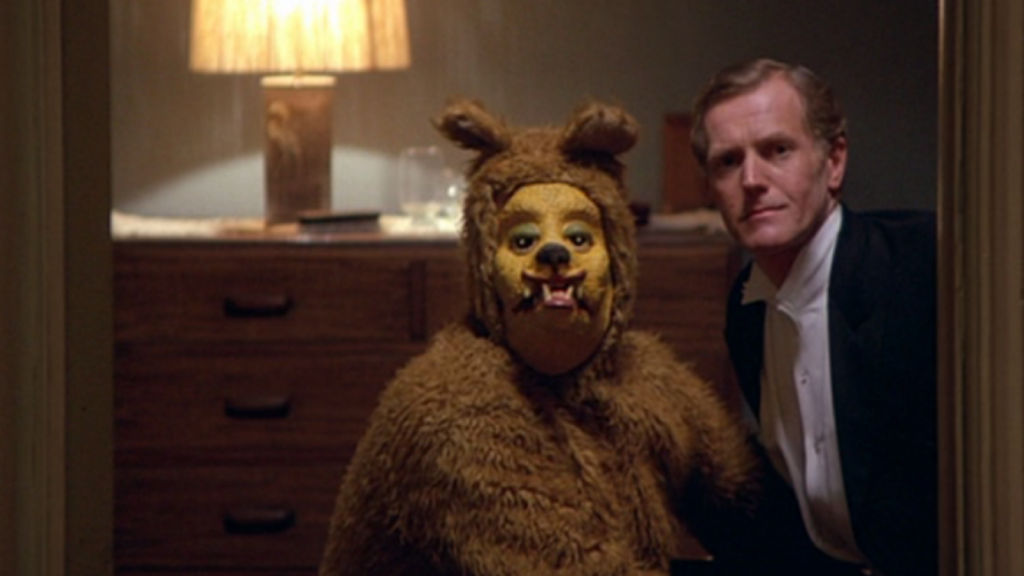
“Kubrick used a 2-second scene to explain what King did in 2-pages.”
So regarding that scene. The dog man is only known as Roger; the man he was servicing is Horace Derwent. In the book, Jack Torrance is very concerned about who the owner of the Overlook hotel is. He obsesses over it. He even goes so far as to call Stuart Ullman, the man who hires him at the beginning of the story, from a payphone and threatens to expose him if he doesn’t give Jack the information he wants for his new book idea, an overview of the Overlook.
The owner of the Overlook is, in fact, Horace Derwent; a mega-wealthy entrepreneur with a damning reputation. He owned the hotel a long time ago, but a string of horrific occurrences forced Horace Derwent to slink into the shadows and out of the public eye.
What we know is that Mr. Derwent had a brief tryst with Roger, our dog-costumed friend. It says that though Mr. Derwent “was AC/DC, he never went back for seconds on his DC side.” King is essentially telling us that our dog has had its day. The costume originates from a vision of the past that keeps merging into our timeline. Roger in his costume, jumping, running, barking, howling, and absolutely humiliating himself in front of an assortment of celebrators.
We learn that Horace Derwent asked Roger to come to the ball in the outfit. The point of Horace’s request was cruelty. He has power over Roger and is exploiting it—flexing his dominance. This was eye-opening. After so many years of being confounded by this bizarre scene (yet not confounded enough to google it), I finally got an answer.
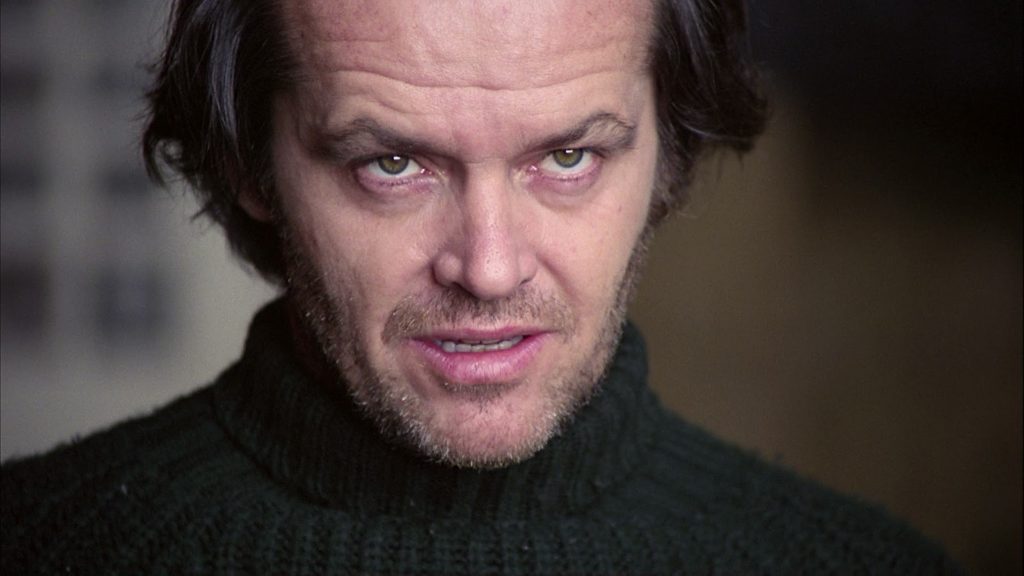
“Jack Nicholson’s performance as Jack Torrance is transcendent.”
My first feeling was that of vexation. Kubrick was seemingly throwing in an arbitrary moment of weirdness with no context. Context (not variety, pfft) is the spice of life, kids, and don’t let anyone tell you otherwise. Then it dawned on me. Kubrick was telling his story the only way he could. My initial dismay came from what I saw as throwing the writer a bone, so to speak; A gift, charity. That didn’t sit well with me. Kubrick had changed enough of the story already; why pander like this? At best, it was an homage but a shallow one at that.
I tell you, I’m not the quickest one in the group. I get there, though, eventually. A wave of clarity came over me, and I was able to float. Kubrick used a 2-second scene to explain what King did in 2-pages. He told the power dynamic at play with an insinuation of a sexual act. In that brief moment, we see a dog servicing his master just as Roger yapped and howled about at the behest of Mr. Derwent at the party.
This is the brilliance of Stanley Kubrick. He can say so much with so little. And of course, the imagination of Stephen King for dreaming up such an idea in the first place. I know King has shared his dissatisfaction with the movie before, and his concern is logical. King says that Kubrick set out to make the scariest movie ever, to be the standard-bearer for horror films going forward, and King agrees that he reached the apex of the genre—but it still wasn’t his story. He’s not wrong about that. Kubrick made lots of changes, some I can understand but others left me baffled.
Given the medium, Kubrick took a horrifying book and molded it into a spectacular feature film while King did what he does best—weaving a nightmarish story with detail and nuance. After all these years of honing my affection for Kubrick’s classic, it now has to share shelf space with King’s masterpiece, and that’s a weird feeling, but I’ll get over it. My main concern right now is tricking my brother into reading the book.

